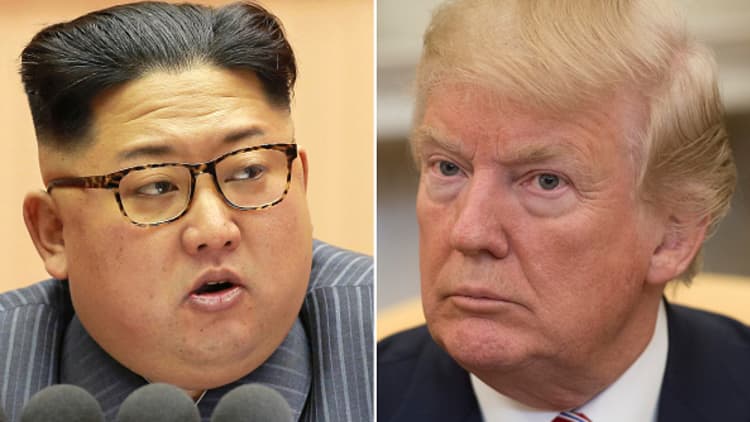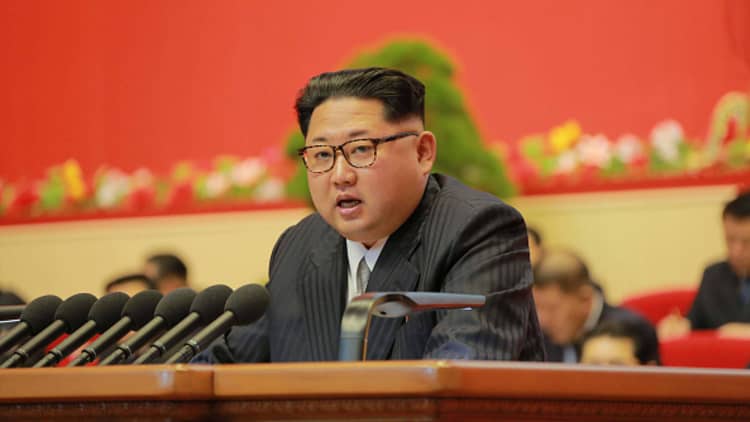
If President Donald Trump follows through with his acceptance of Kim Jong Un's invitation to talk, he'll become the first sitting U.S. president to meet face to face with a North Korean leader.
The announcement of Trump's on-the-spot acceptance of Kim's invitation came hours after South Korean envoys met with key national security officials in the Oval Office on Thursday. Speaking outside the White House, South Korea's National Security Office head Chung Eui-yon said the North Korean leader "expressed eagerness to meet President Trump as soon as possible."
On Saturday, the president posted on Twitter that he had spoken with China ahead of the proposed face-to-face, and that Beijing had expressed gratitude with respect to the offer. For his part, Trump has expressed optimism that the meeting could bear fruit, saying on Twitter Friday that an agreement could be "very good for the world."
While the details of this unprecedented meeting begin to take shape, such a summit would mark a significant breakthrough in a standoff over the North's nuclear weapons. But it's a breakthrough all too familiar to the last American diplomat to successfully secure a deal with North Korea — only to see it fall apart a few years later.
In 1994, U.S. Ambassador-at-Large Robert Gallucci served as the chief U.S. negotiator of the Agreed Framework between President Bill Clinton's administration and Kim Jong Un's father and predecessor, Kim Jong Il.
Under the terms, Pyongyang committed to freezing its illicit plutonium weapons program in exchange for light-water nuclear reactors, heavy fuel and normalized relations with the United States.
"With respect to plutonium, they stuck to the deal," Gallucci, who is now chairman at the U.S.-Korea Institute and a professor at Georgetown University, told CNBC. "The hitch came when we discovered that they were secretly engaged in receiving transfers from Pakistani nuclear scientist A.Q. Khan in uranium enrichment, the other technology used to produce the raw materials for nuclear weapons."
Gallucci said the Clinton administration continued to talk with the North Koreans and didn't inform them that they were aware of the cheating.
"When the Bush administration came in they also didn't tell the North Koreans we were aware, but ultimately in 2002 they confronted them and said it had to stop," Gallucci said.
And so, the North Koreans and the United States decided to pull the plug on the Agreed Framework in the fall of 2002.
"They cheated, and we caught them," Gallucci said, reflecting on the aforementioned events. "From their perspective, they weren't cheating, they were hedging, and we failed to normalize relations with them, which was a key to that deal in 1994."
In 2006, the rogue regime detonated its first nuclear weapon. Since then, Pyongyang has carried out a total of six nuclear weapons tests. In September 2017, Kim's regime claimed it tested a hydrogen bomb, its most powerful weapon to date.
North Korea remains the only nation to have tested nuclear weapons this century.
Even though the 1994 deal disintegrated, the U.S. was able to lull the North's plutonium program and avert a potential military confrontation on the peninsula.
"One lesson from this is that you can do a deal with the North Koreans, and you can get substantial value out of a deal, which we did for about a decade," Gallucci said. "But you can also expect, from our perspective at least, that they will cheat on the deal."
What's more, he said, the North Korea of today is more aggressive than the one Gallucci dealt with 24 years ago.
"North Korea actually has nuclear weapons now and they are on the verge of having true ICBM capability," Gallucci said.
Gallucci also said that while the North Koreans have recently "not been steady negotiating partners, they were in '93 and '94."
As a result, he said he is "not particularly optimistic" about any potential negotiations between the U.S. and North Korea this time around.
"I don't know when I am ever going to recover or if I ever had any optimism to recover about negotiations with Korea," Gallucci said. "I am hopeful that we do get negotiations going, and I'll be hoping that they succeed, but I certainly wouldn't bet any of my own money on it."
WATCH: WH sets conditions for N. Korea meeting



